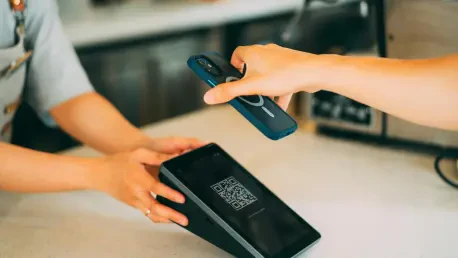Indonesia’s foray into revolutionizing its payment systems marks a significant stride toward empowering its economy. The Quick Response Code Indonesian Standard (QRIS), launched in 2019, has been pivotal in reshaping how digital transactions are conducted within the archipelago. By integrating a single QR code that works seamlessly across various platforms and banks, QRIS replaces the cumbersome card-swiping method. This innovation underscores Indonesia’s strategic intention to diminish its dependence on renowned international payment solutions like Visa and Mastercard. The system not only caters to domestic needs but also extends its functionalities to cross-border transactions with countries such as Malaysia, Thailand, and Singapore, and aims to soon include Japan and China. This development is a testament to Indonesia’s proactive approach in embedding itself within the global financial ecosystem while retaining control over its digital monetary channels.
Expanding the Global Footprint of QRIS
Cross-Border Collaborations
Indonesia is actively pursuing the expansion of QRIS through strategic negotiations with key international partners. Discussions for integrating QRIS are particularly focused on nations such as India, South Korea, and Saudi Arabia. These negotiations are not mere extensions of existing relations but part of a broader commitment by the Indonesian government to elevate its payment system onto a global stage. Such endeavors align with Indonesia’s strategic intention to retain digital sovereignty amid increasing global protectionism trends.
This systematic expansion reflects a calculated approach by the Indonesian authorities to ensure that the QRIS system is both robust and resilient when operating in diverse markets. It allows Indonesia to forge and reinforce economic ties with significant trade partners while solidifying its own financial autonomy. By negotiating cross-border integrations, the country establishes a unique position, playing a central role in evolving financial landscapes and potentially influencing regional transaction norms. Such partnerships enable QRIS to adapt to varied regulatory frameworks, ensuring its successful deployment across international borders.
Embracing Digital Sovereignty
The heart of Indonesia’s QRIS strategy lies in its emphasis on digital sovereignty—a vital aspect that defines the country’s broader economic ambitions. As digital infrastructures become critical to national operations, Indonesia seeks to anchor its financial proceedings to domestic systems, reducing reliance on foreign technologies. By advocating for widespread adoption of QRIS, the nation envisions a more secure, accessible, and efficient financial environment.
This approach not only enhances security but also diminishes the risk associated with external technological manipulation. As cyber threats intensify globally, safeguarding financial systems has become paramount. QRIS, therefore, stands as a robust tool that supports national interests while contributing to a more stable financial landscape. Pursuing such sovereignty ensures that financial operations are conducted independently, aligning with broader strategies to foster economic resilience and growth.
Navigating Challenges and Future Prospects
Economic Growth Through QRIS
Reports of transaction increments highlight QRIS’s pivotal role in fostering economic activity. There has been an impressive 169 percent upsurge in transaction volume annually, signaling its growing acceptance and importance among users. Major financial institutions in Indonesia, such as PT Bank Central Asia and PT Bank Mandiri, have experienced remarkable upticks in both transaction frequency and monetary value facilitated through QRIS. This uptake signals that people trust and actively engage with this innovative payment method.
Essentially, QRIS contributes to shaping a more inclusive financial ecosystem, enabling market access to those previously underserved or reliant on traditional banking pathways. The system’s ability to cater to individuals lacking international credit tools further broadens customer bases and unlocks economic potential in untapped regions. Banks and financial entities benefit from this expanded market serviceability, creating a win-win scenario where both providers and consumers thrive within an evolving digital economy framework.
Addressing International Concerns
Despite the positive outcomes QRIS has brought to the table, it has not been without scrutiny—most notably by the United States. Concerns have emerged surrounding the absence of international stakeholder consultation during policy framing processes. Such feedback suggests potential friction with established payment systems globally. However, Indonesian authorities are committed to navigating and resolving these concerns constructively, ensuring that the benefits of QRIS reach a wide spectrum of users, both domestic and international.
Experts, such as economic analyst Aknolt Kristian Pakpahan, underscore the significance of QRIS as a transformative tool that embodies Indonesia’s financial system sovereignty. It presents an independent alternative that accommodates varied global user demands, aligning with the principles of financial inclusivity and accountability. By undertaking measures to address international feedback while advocating for QRIS, Indonesia pledges to enhance its system’s robustness, ensuring sustainable growth and seamless integration with the global payment network.
Future Trajectories in Digital Finance
Indonesia is proactively working on expanding the QRIS system by engaging in strategic dialogues with key international partners. The focus is on integrating QRIS with nations like India, South Korea, and Saudi Arabia. These discussions are part of a larger initiative by the Indonesian government, aiming to elevate the country’s payment systems to an international level. Such moves align with Indonesia’s goal to maintain digital sovereignty amidst global protectionism trends.
This expansion follows a planned approach by Indonesian officials to ensure QRIS is robust and adaptable across diverse markets. It strengthens Indonesia’s economic ties with major trade partners while enhancing its financial independence. Through cross-border integration talks, Indonesia positions itself as a pivotal player in the evolving financial landscape, with the ability to potentially influence regional transaction standards. These partnerships allow QRIS to navigate varied regulatory environments, ensuring its effective deployment while safeguarding Indonesia’s financial autonomy on an international scale.









